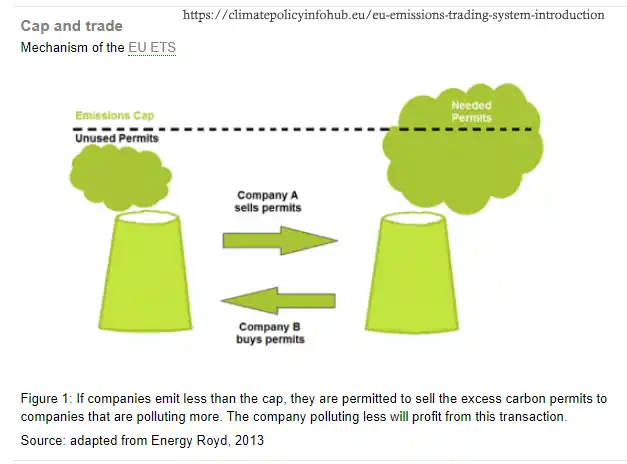In the continuously evolving landscape of renewable energy and emissions control, the UK Government's response to the consultation on the UK Emissions Trading Scheme (UK-ETS) throws into sharp relief the stark reality of policy disconnect with the globally burgeoning biogas sector.
The Anaerobic Digestion and Bioresources Association (ADBA) has been left hanging by a thread of empty promises and vaguely defined intentions. What is ostensibly required is a tangible commitment and a robust framework to integrate biogas and biomethane into the trading scheme.
Indeed, Chris Huhne, Chairman of ADBA and former Energy and Climate Secretary, makes a compelling argument in favour of this integration. The potential for biogas to match the nuclear sector in size by 2030 is not a pipe dream, but a feasible scenario if given the right environment to flourish.
UK Emissions Trading Scheme Disappointment
Sadly, the government's response does nothing more than acknowledge the importance of biomethane in achieving net zero emissions. The vague commitment to “explore” the connection between biomethane and the UK-ETS is a far cry from the definitive policy direction needed to catalyze the growth of the biogas industry.
While the UK Government’s response gives a nod to other government support schemes for biomethane, it fails to provide specific details or a clear strategy.
The onus is now on the government to move beyond diplomatic rhetoric and deliver a solid plan that encourages, not just recognizes, the value of biomethane and biogas in the nation’s journey towards decarbonization.
In the absence of such a clear direction, the biogas sector risks stagnation at a time when urgency is of paramount importance.

ADBA Press Release 03 July, 2023:
Biogas association comments on UK Governments’ response to UK Emissions Trading Scheme consultation
The Anaerobic Digestion and Bioresources Association (ADBA) has reacted to the publication, today, of the outcome of the Developing the UK Emissions Trading Scheme consultation launched in March 2022 by the UK-ETS Authority made up of DESNZ, the Welsh Government, the Scottish Government, and DAERA of Northern Ireland.
Chris Huhne, Chairman of ADBA and former Energy and Climate Secretary, said:
Bringing biogas and biomethane into the emissions trading scheme would make economic sense, as it would create a level playing field for biogas producers to show what they can do to reduce carbon emissions. The sector can grow to a similar size as nuclear by 2030, but it needs the assurance of the ETS to grow rapidly.
In the publication, the UK-ETS states that:
“We acknowledge the role biomethane will have in delivering net zero. While there are other government support schemes for biomethane, we recognise how the UK ETS can support the development of low-carbon technologies as part of a package of measures to deliver emissions reductions.
We will explore the interactions between biomethane and the UK ETS and expect to set out further details in due course.”
Press Release Ends
Here is our roundup of opinions on this:
UK Government Under Fire for Lack of Support for Emissions Trade Scheme
Proposed UK Emissions Trade Scheme faces criticism from environmentalists and experts
The UK government is facing intense scrutiny and criticism for its lack of support for the proposed UK Emissions Trade Scheme (ETS). Environmentalists and experts in international carbon trading schemes have raised concerns about the government's hesitation to fully embrace this replacement for the European Union's ETS, which the UK promised to reinstate for its nations after Brexit.
The UK ETS, which is set to start in 2021, aims to replace the EU ETS and ensure that the UK continues to participate in international efforts to tackle climate change. However, the lack of positive support from the government has raised doubts about the effectiveness of this new scheme and whether it will align with the UK's long-term climate policy ambitions.
Lack of government support raises concerns about the effectiveness of the UK ETS
One of the main concerns raised by environmentalists is the government's failure to provide a clear and robust framework for the UK ETS. Without strong support from the government, there are fears that the scheme may not effectively incentivize industries to cut emissions and meet climate targets. This lack of support also raises questions about the government's commitment to addressing climate change and transitioning to a low-carbon economy.
Environmentalists slam the government's failure to embrace the UK Emissions Trading Scheme
Environmental organizations have been vocal in their criticism of the government's lack of support for the UK ETS. They argue that without strong government backing, the scheme may fail to achieve its intended goals and effectively reduce carbon emissions. They also point out that the government's failure to fully embrace the UK ETS contradicts its promises to prioritize environmental issues and combat climate change.
The lack of positive support from the government has also raised concerns about the UK's ability to meet its climate targets and fulfil its international commitments. Environmentalists argue that without a strong emissions trading scheme in place, it will be challenging for the UK to effectively reduce its carbon emissions and contribute to global efforts to mitigate climate change.
UK Emissions Trading Scheme Receives Cold Shoulder from Government
The proposed UK Emissions Trade Scheme faces a lack of enthusiasm and support from the government
The proposed UK Emissions Trade Scheme (ETS) is receiving a cold shoulder from the UK government, raising concerns about its effectiveness and alignment with the country's climate policy ambitions. Experts in international carbon trading schemes and environmentalists have voiced their disappointment with the government's lack of enthusiasm for this replacement for the European Union's ETS, which the UK promised to reinstate after Brexit.
Lack of government backing raises doubts about the effectiveness of the UK ETS
 The lack of support from the government has raised doubts about the effectiveness of the UK ETS in incentivizing industries to reduce their carbon emissions. Without strong backing from the government, there are concerns about the scheme's ability to achieve significant emissions reductions and contribute to the UK's climate targets.
The lack of support from the government has raised doubts about the effectiveness of the UK ETS in incentivizing industries to reduce their carbon emissions. Without strong backing from the government, there are concerns about the scheme's ability to achieve significant emissions reductions and contribute to the UK's climate targets.
Experts argue that the UK ETS should closely align with its EU counterpart to ensure a smooth transition and maintain continuity in carbon markets. However, the government's hesitation to fully reinstate the EU's ETS after Brexit has cast uncertainty over the future of the UK ETS and its ability to effectively replace the EU scheme.
The UK government's lack of support contradicts promises to address climate change
Environmentalists have criticized the government for its failure to fully embrace the UK ETS, arguing that it contradicts its promises to prioritize environmental issues and combat climate change. They argue that without strong government backing, the scheme may fall short of its goals and hinder the UK's efforts to reduce carbon emissions and meet its climate targets.
Environmentalists stress the importance of a robust emissions trading scheme in reducing carbon emissions and transitioning to a low-carbon economy.
Brexit Fallout: UK Government Hesitates to Reinstate EU's ETS
UK government hesitates to reinstate EU's ETS after Brexit
The UK government is facing criticism for its hesitation to reinstate the European Union's Emissions Trading Scheme (ETS) after Brexit. The government had promised to reinstate a replacement scheme, known as the UK Emissions Trading Scheme (ETS), for the UK nations. However, the lack of positive support from the government has raised doubts about the future of carbon trading in the UK.
Hesitation raises concerns about the UK's commitment to climate change mitigation
Environmentalists and experts in international carbon trading schemes have raised concerns about the government's hesitation to fully reinstate the EU's ETS. They argue that this hesitation contradicts the government's promises to prioritize environmental issues and combat climate change. It raises questions about the UK's commitment to addressing climate change and its ability to effectively reduce carbon emissions.
Environmentalists Slam UK Government for Failure to Embrace Emissions Trade Scheme
Environmentalists express disappointment with the UK government's lack of support for the Emissions Trade Scheme
Environmentalists have criticized the UK government for its failure to fully embrace the proposed UK Emissions Trade Scheme (ETS). They argue that without strong government backing, the scheme may not effectively incentivize industries to reduce their carbon emissions and contribute to climate change mitigation efforts.
Failure to support the ETS contradicts government promises
The government's lack of support for the ETS contradicts its promises to prioritize environmental issues and combat climate change. Environmentalists argue that a robust emissions trading scheme is essential for reducing carbon emissions and transitioning to a low-carbon economy.
The lack of enthusiasm from the government also raises concerns about the UK's ability to meet its climate targets and fulfil its international commitments. Environmentalists stress the importance of government support in driving forward climate action and achieving emissions reduction goals.
UK Government Backtracks on Promise to Reinstate EU's ETS After Brexit
UK government backtracks on promise to reinstate the EU's ETS after Brexit
The UK government is facing backlash for backtracking on its promise to reinstate the European Union's Emissions Trading Scheme (ETS) after Brexit. Instead of fully embracing the EU's ETS, the government has proposed a replacement scheme, known as the UK Emissions Trading Scheme (ETS), which has received criticism for its lack of support.
Backtracking raises doubts about the government's commitment to climate change mitigation
The government's failure to fully reinstate the EU's ETS raises doubts about its commitment to addressing climate change and reducing carbon emissions.
UK Emissions Trading Registry FAQ
What is the UK Emissions Trading Scheme (UK ETS)?
The UK Emissions Trading Scheme (UK ETS) is the UK's key policy tool for reducing greenhouse gas emissions from power and heat generation, energy-intensive industries, and aviation. It operates on the ‘cap and trade' principle where a cap is set on the total amount of certain greenhouse gases that can be emitted by sectors covered by the scheme. Within this cap, companies receive or buy emission allowances which they can trade with one another as needed. The cap is reduced over time, meaning the total emissions from sectors covered by the scheme decrease. The UK ETS was established following the UK's exit from the European Union, replacing its participation in the EU Emissions Trading Scheme (EU ETS).
What is the UK Emissions Trading Registry?
The UK Emissions Trading Registry is a system that tracks the ownership of emission allowances within the UK's Emissions Trading Scheme (UK ETS). It records transactions, surrenders, and cancellations of carbon credits, ensuring transparency and accountability in emissions trading.
UK Emissions Trading Scheme (UK ETS) Authority
Who constitutes the UK ETS Authority?
The UK ETS Authority consists of the Department for Business, Energy and Industrial Strategy (BEIS), the Welsh Government, the Scottish Government, and the Department of Agriculture, Environment and Rural Affairs (DAERA) of Northern Ireland.
Carbon Credits UK Price
What is the current price of carbon credits in the UK?
It's recommended to check a reliable financial news source or the UK ETS's official website for the most up-to-date pricing.
The price of carbon credits in the UK and the EU ETS can vary and is determined by supply and demand factors in the market. The UK operates its own carbon pricing mechanism, known as the Carbon Price Support (CPS), which sets a price floor for carbon emissions from power generation. As of September 2021, the CPS price was £18.08 per tonne of CO2.
On the other hand, the EU ETS is a system that covers all EU member states and sets a cap on greenhouse gas emissions for certain sectors. The price of carbon under the EU ETS is determined through a market-based approach, with emissions allowances being traded on exchanges. As of September 2021, the price of carbon under the EU ETS was around €57 per tonne of CO2.
It's important to note that these prices are subject to change as they are influenced by various factors such as economic conditions, regulatory changes, and market dynamics. For the most accurate and up-to-date information on the current prices, as already stated above, it is recommended to consult reliable sources such as carbon market platforms, government websites, or industry reports.
UK Emissions Trading Scheme (UK ETS) Price Chart
Where can I find a price chart for the UK ETS?
A price chart for the UK ETS can be found on financial market websites, carbon market databases, or on the UK government's official website. These charts provide historical and current data on the price of carbon credits within the UK ETS.
UK Emissions Trading Scheme Shipping
How does the UK ETS apply to shipping?
As of my knowledge cutoff in September 2021, the UK ETS had not yet included the shipping sector. However, the government had expressed intent to consider its inclusion. It is advisable to check the most recent legislation or updates from the UK ETS Authority for the current status.
UK Emissions Trading Scheme Price
How is the price of UK ETS determined?
The price of allowances in the UK ETS is determined by supply and demand in the market. Factors that can affect price include the overall cap on emissions set by the government, industrial output levels, energy prices, and even weather patterns.
UK ETS Aviation
Does the UK ETS apply to the aviation industry?
Yes, the UK ETS applies to the aviation industry. Domestic and international flights operated by UK airlines fall under the scope of the UK ETS, with some exceptions for small emitters and operators with low-intensity activities.
UK Emissions Trading Scheme UK ETS Legislation
What legislation governs the UK ETS?
The primary legislation governing the UK ETS is The Greenhouse Gas Emissions Trading Scheme Order 2020. It provides the regulatory framework for the operation of the UK's emissions trading scheme following its exit from the EU ETS after Brexit. This includes rules on monitoring, reporting, and verification of emissions, as well as allocation of allowances.







